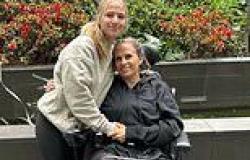
Friday 25 November 2022 11:29 PM DR MICHAEL MOSLEY: The simple steps I'm taking to help ward off cancer trends now
As anyone who has seen a friend or loved one die from cancer knows, it can be a terrible disease.
Half of us will develop cancer at some point in our lives, so most will be affected in some way.
Over the past couple of years, I have lost two friends to cancer, both relatively young. My dad discovered he had prostate cancer at around my age (I am 65), so I know that I am at greater risk. I have regular PSA (prostate specific antigen) tests and I have also recently had a bowel scope (an examination of the bowel using a tiny camera).
Other things I do to keep cancer at bay include short bursts of high-intensity interval training (HIIT) and following a healthy, relatively low-carb diet.
So it was reassuring to see new research showing that both these approaches can impact cancers, by starving them of their preferred energy source, glucose in your blood. This seems not only to stop cancer cells spreading, but also prevent the disease recurring in people who’ve had it.

Dr Michael Mosley talks about the simple steps he is taking to ward off cancer
While there are drugs being trialled that can also do this, they are some way off reaching patients. Meanwhile, changes to diet and activity levels are things you can implement immediately.
Cancers arise because of a mutation in the DNA in certain cells. If these mutant cells grow and manage to elude your immune system, then they can spread throughout your body.
If you catch cancer early enough then the usual options are to cut it out (i.e. surgery) and/or destroy it using radiotherapy and/or chemotherapy. Increasingly there has been a lot of success using immunotherapy, an approach where the immune system is switched on to fight the cancer.
However, there’s also mounting evidence that you can weaken a cancer by starving it of the fuel it needs to grow — blood glucose.
H ow can you reduce a cancer’s fuel supply without damaging other cells? That’s where two relatively simple approaches come in.
The first is HIIT: we’ve known for some time that exercise can cut your risk of cancer, by up to 35 per cent for some forms.

Analysis of data from 3,000 people over a 20-year period showed that those who did intense aerobic exercise were 72 per cent less likely to develop metastatic cancer (cancer that had spread) than those who did no exercise
Now a study by Tel Aviv University has shown that doing high-intensity aerobic exercise (i.e. running or cycling) is particularly effective. Analysis of data from 3,000 people over a 20-year period showed that those who did intense aerobic exercise were 72 per cent less likely to develop metastatic cancer (cancer that had spread) than those who did no exercise.
To find out what was going on, researchers injected mice that had run on treadmills with cancer cells. They discovered that the running caused muscles and organs, such as the lungs and liver, to grow more glucose receptors on their surface.
In other words, they could ‘suck in’ more glucose from the blood, depriving the cancer cells of





